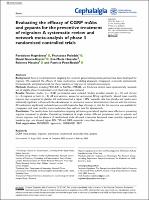Evaluating the efficacy of CGRP mAbs and gepants for the preventive treatment of migraine: A systematic review and network meta-analysis of phase 3 randomised controlled trials
Author
Date
2023-04Permanent link
https://hdl.handle.net/11351/9211DOI
10.1177/03331024231159366
ISSN
1468-2982
PMID
36855951
Abstract
Background
Several novel treatments targeting the calcitonin gene-related peptide pathway have been developed for migraine. We evaluated the efficacy of these medications, including atogepant, rimegepant, erenumab, eptinezumab, fremanezumab, and galcanezumab, for the prevention of migraine via network meta-analysis.
Methods
Databases, including MEDLINE via PubMed, EMBASE, and Cochrane central, were systematically reviewed, and all eligible phase 3 randomised controlled trials were included.
Results
Nineteen studies (n = 14,584 participants) were included. Studies included episodic (n = 11) and chronic (n = 4) migraine or both (n = 4). All interventions, except for eptinzumab 30 mg, significantly reduced mean monthly migraine days compared to placebo. All medications had a higher ≥50% responder rate than placebo and results were statistically significant in those with the subcutaneous or intravenous route of administrations, but not with the oral one. All medications significantly reduced mean monthly headache days, although no data for this outcome was available for rimegepant, and mean monthly acute medication days, with no data for eptinezumab.
Conclusion
The results show that medications targeting calcitonin gene-related peptide were effective in preventing migraine compared to placebo. Considering limitations of single studies, different populations such as episodic and chronic migraine, and the absence of head-to-head trials, all novel treatments decreased mean monthly migraine and headache days, and showed higher 50%, 75% and 100% responder rates than placebo.
Keywords
Migraine; PreventionBibliographic citation
Haghdoost F, Puledda F, Garcia-Azorin D, Huessler EM, Messina R, Pozo-Rosich P. Evaluating the efficacy of CGRP mAbs and gepants for the preventive treatment of migraine: A systematic review and network meta-analysis of phase 3 randomised controlled trials. Cephalalgia. 2023 Apr;43(4):1–14.
Audience
Professionals
This item appears in following collections
- HVH - Articles científics [4476]
- VHIR - Articles científics [1751]
The following license files are associated with this item:

 Private area
Private area Contact Us
Contact Us








